Choosing the Right Sober Living Environment: A Comprehensive Guide
Understanding Sober Living Environments
Choosing the right sober living environment is a critical step toward maintaining long-term sobriety. These environments offer a supportive community for individuals in recovery, providing structure and stability as they transition from rehabilitation programs back into everyday life. The right choice can significantly impact one's journey, offering the necessary tools and support to foster resilience and personal growth.
When considering sober living options, it's essential to evaluate various factors, including location, cost, rules, and the type of support offered. Each element plays a vital role in ensuring the environment aligns with your recovery goals and personal needs.

Types of Sober Living Homes
Sober living homes come in various forms, each catering to different needs and stages of recovery. Some environments focus on a highly structured approach with strict rules and scheduled activities, while others offer more lenient settings, allowing residents greater autonomy.
Halfway houses are often government-funded and provide a structured environment for individuals transitioning from institutional care. Transitional housing, on the other hand, may offer more flexible arrangements and is typically privately funded. Understanding these distinctions is crucial in making an informed choice that suits your recovery journey.
Key Features to Consider
When selecting a sober living environment, certain features are vital to consider. Location is often a primary concern; choosing a home close to family or work can make the transition smoother. Additionally, ensure the home is situated in a safe neighborhood with access to public transportation if needed.

Cost is another crucial factor. While some facilities may be covered by insurance or government programs, others might require out-of-pocket payments. It's essential to understand your financial responsibilities upfront to avoid stress later on.
Community and Support Systems
A strong support system is integral to recovery. Look for homes that offer group meetings, counseling services, and peer support. Engaging with a community of individuals who understand your experiences can significantly bolster your recovery process.
Additionally, consider the availability of amenities such as fitness centers, recreational activities, and opportunities for skill development. These features can enhance your experience, offering outlets for stress and opportunities for personal growth.

The Importance of House Rules
Sober living homes typically have rules designed to maintain a safe and supportive environment. These may include curfews, mandatory meeting attendance, drug testing, and participation in household chores. Understanding and agreeing with these rules is crucial before committing to any facility.
These structures not only help maintain order but also instill discipline and accountability—key components of successful recovery. Ensure you are comfortable with the level of structure offered and that it aligns with your personal recovery plan.
Visit and Ask Questions
Before finalizing your decision, visit potential homes to get a sense of the environment and community. Speak with current residents and staff to gain insights into their experiences. This firsthand information can be invaluable in determining if the home is the right fit for you.
Prepare a list of questions to ask during your visit. Inquire about their approach to relapse prevention, the types of support offered, and any success stories they can share. These questions can help you assess whether the home meets your expectations and needs.
In conclusion, choosing the right sober living environment requires careful consideration and research. By understanding the types of homes available, evaluating key features, and asking pertinent questions, you can make an informed decision that supports your path to sustained sobriety.
